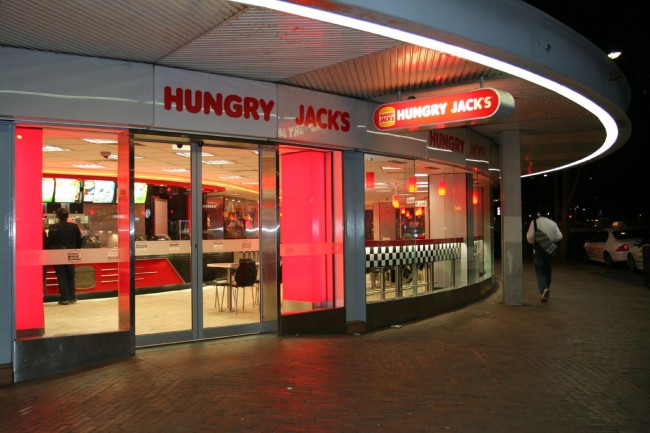By Salvatore Babones
Fast-food workers are holding strikes and demonstrations in dozens of U.S. cities. The “Fight for 15” campaign demands a $15 living wage and the right to form a union without interference from employers.
Critics say a living wage would drive fast-food restaurants and other retail firms out of business — and millions of their employees out of work.
Supporters observe that minimum wages in other countries can be much higher than ours, and they still have fast food.
Australia in particular has a very high minimum wage: 16.37 Australian dollars an hour. At current exchange rates that’s about $15 an hour, more than twice our minimum and equal to the Fight for 15 demand.
Not surprisingly, some U.S. media outlets are mulling Australia’s example.
Jordan Weissmann, who writes about business for The Atlantic, points out that the Australian minimum amounts to just $9.77 an hour, after addressing the cost-of-living adjustments calculated by the Organization for Economic Cooperation and Development (OECD).
The U.S. minimum wage stands at $7.10 an hour, using the same adjustment.
So instead of Australia’s minimum wage being twice the U.S. minimum, it’s just 37.6 percent higher, right?
Wrong.
First, most fast-food workers would love a 37.6 percent raise. If the difference is “only” 37.6 percent, bring it on!
Second, every Australian fast-food worker has full national health insurance coverage with no deductibles and no co-pays. Bring that on too.
Third, very few Australians are paid the statutory minimum wage.
Instead, nearly every hourly Australian worker is covered by an “industry award” negotiated with their employers by a government agency called Fair Work Australia. The fast-food industry is no exception.
The minimum fast food industry award for an entry-level adult fast-food worker is 17.98 Australian dollars an hour.
 In U.S. dollar terms that’s $16.50 an hour at current exchange rates or $11.99 an hour at the OECD’s “purchasing power parity” exchange rate.
In U.S. dollar terms that’s $16.50 an hour at current exchange rates or $11.99 an hour at the OECD’s “purchasing power parity” exchange rate.
But wait — there’s more.
All full-time workers are entitled to four weeks of annual vacation time, 10 paid holidays, and 10 paid sick days, according to the minimum National Employment Standards.
You also get up to 10 paid days off for jury duty.
Fast-food employers also contribute at least 9.25 percent of their employees’ pay into the workers’ retirement funds.
If full-time workers are so expensive, why don’t employers just make everyone part-time?
The Australians have thought of that. Part-time workers get 25 percent extra pay to compensate for their lost days off, bringing their hourly pay to 22.48 Australian dollars an hour.
That’s $20.66 an hour in U.S. dollars, or $14.99 an hour using conservatives’ preferred OECD exchange rate.
So we’re right back at…15 bucks an hour.
Plus full, no deductible, no co-pay health insurance and 9.25 percent retirement contributions. Yes, part-time workers in Australia get that too.
And lest any pro-business readers retort that U.S. companies make retirement contributions in the form of Social Security payroll taxes, Australian companies pay payroll taxes too.
Australian payroll taxes vary from state to state, but are in the range of 5-6 percent, just below the U.S. employer contribution of 6.2 percent.
All told, Australian fast-food workers are paid at least twice as much, and including benefits perhaps as much as three times as much, as American fast-food workers.
You can still get fast food in Australia. Fast food is also available all over Europe, where similar pro-worker rules are in place. The details differ country by country, but all western European countries offer ordinary workers a better deal than the United States.
For sure, the fast-food industry does not like the idea of paying workers more and executives less. But economic policy shouldn’t cater only to the interests of executives.
Americans on the economic ladder’s bottom rung would benefit enormously from a $15 living wage. We should make that living wage the minimum wage. We can afford it. We just have to do it.
![]()
Salvatore Babones is an American sociologist at the University of Sydney in Australia and an Institute for Policy Studies associate fellow.































tom dooly still hangin 'round says
Sorry; been there done that. Don’t like it? Then do what i did; get 2 more jobs too make ends meet; (had 3 jobs; 2 full time at 2 fast food restaurant’s and 1 part time at another restaurant and i’m still here bugging you;ha-ha); then ‘work your way up”. We all have to work our way up; wherever that may be? Work builds character and teaches you how to deal with people (which by the way is the “hardest” job you will ever have).Learn to be nice and respect everyone (which is hard everyday; but once you get use to it it because easy; {like just saying good morning}) We all “get up on the wrong side of the bed” sometimes; but we make the best of it; like life. So remember life is a learing experience every single day. Have a good day; if not then MAKE IT A GOOD DAY!
Genie says
@ tom dooly: I love your outlook. Thanks for sharing it.
BIG JOHN says
Imagine if we all got a 50% raise. How much would that stimulate the economy? A lot better than giving Wall Street investment PIGS more of our money that they use to gamble on derivatives and other NON-PRODUCTIVE financial instruments. If we all got 50% raises and had free health care then America would be on the path to exceptionalism. Instead we are on the path of imperialism and feudalism.
Anonymous says
“FREE health care” that a good one.
Florida Native says
Note: This is The United States not Australia. If we raise the minimum wage much more a Big Mac will be $6….There’s no free lunch.
Sherry Epley says
While I am all for a decent minimum wage, this article leaves out the very relevant fact that the cost of living in Australia is much higher than it is in the USA. I have traveled extensively in Australia in the past couple of years. The cost of fast food, and mostly everything else, is about 40-50% higher than here. Take a look at this “cost of living comparison” web site. . . very, very interesting: http://www.numbeo.com/cost-of-living/compare_countries_result.jsp?country1=United+States&country2=Australia
In addition, the service there, even in the higher end restaurants, is almost non-existent. In many eateries where you pay 30-40 a person for dinner (not including alcohol), their service is often “fast food” style where you place your order at a window, collect your own table ware and water, and then put a number on your table and your food is brought to you. Saying that, like Europe, “service” is included in the price. Something to think about when our system of tipping gets annoying.
JL says
I have to agree with Sherry. My son just visited the country 2 months ago. He loved it there and told me about the minimum wage. However, he also told me how expensive everything was. To buy a pair of basic tennis shoes – $200.00 (they weren’t the designer name brand). He couldn’t afford to buy anything once he was there.
We’re not saying the fast food industry would disappear with $15.00 hr wages and full benefits for part time workers. But it will come at a steep price this economy can’t handle.
Devrie says
Is it just me or didn’t the article address the cost of living in Australia after all?
Seminole Pride says
If you are going to give these Fast Food hamburger flippers a standard of living raise. I suggest you triple the pay of a college educated person. My daughter graduated from college with honors, and her first job out of college only paid $ 12.00 a hour.
Geezer says
McDonald’s can pay people 20.00 an hour, and still not have to raise prices.
Just look at the volume of business they do at breakfast and lunch.
It’s a money factory.
These chains don’t just want to make a profit, they want to make runaway profits.
So you don’t agree with 20.00 per hour, well then make that 13.00 an hour.
No wonder there’s so much turnaround and slipshod work.
Do you really trust food prepared by underpaid, pissed off workers?
These people need to be compensated with a living wage. It’s only fair.
Charlie M Lima says
I am all for people getting paid what they deserve but how will this impact other positions. I am in the hiring process for a firefighting / emergency medical technician position in a county two hours from my home and the starting pay is $9.00 an hour. To save lives. I have 10 years restaurant experience and truthfully I am disgusted with how poorly paid restaurant staff can be but I have to point out: what do we do if this happens for this particular industry but not others? Will we all be running to pick up jobs like these and leave vacancies in other necessary fields? Don’t get me wrong my passion is for the job I am applying for. I have worked hard, spent thousands on school. I am going to pursue my dream job. However, I do believe I would find it insulting if I worked so hard to make so little both to achieve the certifications I have and working hard every day on the job while someone still in highschool starts out their first job making more than me. I have family who have made a 30 year career with McDonalds and been very satisfied (though underpaid) with the living they have made from it. I don’t think there is anything wrong with making a living from the fast food industry; in fact I tried to get hired by a few of them while going through school but I was deemed “overqualified”. At the same time two of my brothers (one a high school drop out and the other a highschool graduate with no job experience were able to get hired on at some of the fast food restaurants I was applying to with my 10 years of restaurant knowledge and 15 years of working experience. What I am trying to get at is there has to be balance; I know we are not an all or nothing nation but I do believe that something should be done to increase the wages across the board for underpaid positions and I agree with “Big John”. We are giving WAY too much to bail outs and government salaries are absurd in some cases with huge increases yearly but without a better solution for those of us those people represent and are relying on these people to help make our lives better. If you went to work and asked for a raise but your productivity had decreased, your percentages lowered and your company was doing worse and their debt had increased what do you think their response would be?
Sherry Epley says
Here is the “bottom line”. . . the government does NOT regulate profits. We are experiencing the very greedy side of “Capitalism”. The problem is. . . when our minimum wage is raised, or any worker benefits are increased, the multi-billionaires who own most of our fast food companies REFUSE to receive even one less cent in their personal income. Often their billions are kept in off shore accounts, or invested in “other” countries, so they pay as little as possible in personal or corporate income tax in the USA. They hire the cheapest labor, even if that person isn’t exactly legally here in the USA.
When the minimum wage is increased, to keep their profits at their highest, the fast food chain owners often will simply raise the price of their products or lower the cost of that burger by decreasing the size or the quality of the ingredients.
The government cannot instill employer caring and loyality. Our government can only raise the minimum wage and hope that the owners and corporate heads of these mega corporations will somehow take a tiny bit less in profit and help their employees have better lives.
The ones that can send a message to the GREEDY heads of big business are WE consumers. . . in the choices we make. For example, I personally do the vast majority of my shopping at Target and Publix (where I am willing to pay a tiny bit more), because Walmart time and time again has shown that they do not treat their employees very well. I refuse to patronize a company that treats people the way they do. I know my efforts are extremely tiny, but consider the possibility that if millions did the same, we seriously effect the profit margin of those companies that abuse their workers. We could send a big message of hope for the American worker, through our spending habits.
Geezer says
My father was a waiter in the 60’s and 70’s, and we lived very comfortably in our own house, had late model cars, and money in the bank.
He supported a family of four, all on his own, waiting tables.
Our house cost $21,000 (in ’73), our 1969 Delta 88 was $2,900, bread was .25 a loaf.
Pizza, .10 a slice…in NYC.
Gas was .35 a gallon (regular). Dad made about $10k a year.
Things today are about 10x more expensive than in ’69.
But most people don’t earn 10x more today.
Know any waiters today pulling in $100,000?
Waiters are now mostly kids.
America was a great place 44 years ago. I miss it dearly.
Howard Duley says
Why should the useless bottom of the barrel feeders get $20/hr. Why not give them the same amount as the individual that wrote this article. After all most of them have at least a Masters or a PHD.
Sherry Epley says
May we all be blessed with the education and opportunity to compete “fairly” for full time jobs where our employers have great compensation packages and benefits. Unfortunately THAT simply is not the current situation in our country and especially not in our state.
May we love our fellow human beings and not be racist and prejudice against those who have been down trodden by our still biased society. May we not characterize them most unfairly and call them names. . . for those words will in some way come back to haunt us in a most painful way. May we not be filled with the fear and hate that is fed to us by media outlets and organizations that profit from such madness. . . much to our detriment. May we become wise enough to see through the lies and propaganda that is dividing us and making our nation weaker by the moment.
May we rise and evolve in a postitive, health way towards a civilization filled with kindness, caring, sharing, peace, compassion, sanity, security, ethics, integrity and honesty.